Proper nutrition for weight loss began to interest us the moment we understood that diets don't help. Diets don't help - it's a fact. Why? The answer lies in the prohibitions and prohibitions that abound in the modern and well-known diet, "proven over the years. "Proper nutrition for weight loss should be varied, healthy and nutritious, no matter how strange it may sound. There are some basic principles of nutrition. And also lots of misunderstandings, misjudgments, stories about fantastic superfoods, blacklists of "dangerous foods", as well as stories about their incredible rehabilitation.

Before starting to talk about nutrition, it is necessary to understand that in recent years, more precisely, over the last 25-30 years, the balance of basic nutrients - proteins, fats and carbohydrates - has been quite inclined towards the carbohydrate component. At the same time, you don't have to push and count too much - just go to any store and look at the window with sweets. They take up almost a quarter of the store space! And the first step to switching to the right diet for weight loss is the complete rejection of sugar in the daily diet. Sounds scary, right? Do you know why? Because sugar addiction is similar to drug addiction.
- Well, it started. . . - someone will say in disappointment, - Again the prohibitions and prohibitions!
A few minutes of your attention, and you'll agree that quitting sugar can be a major breakthrough in improving your health and, as a result, losing weight.
We need carbohydrates, of course. But which one? We've all heard of fast and slow carbohydrates. We need a slow one. Dish made of cereals, wheat flour, vegetables. . . Fruits and berries are full of fast carbs, but it's better to eat fruit and berries than buy candy in the pastry department. Many nutritionists propose to expressly and suddenly abandon carbohydrates, and in any form, reduce their consumption to 20-50 g per day. A sharp transition from a habit to a useful one can lead to dizziness, loss of energy, a bad mood and the belief that it is not so useful and that it is proper nutrition.
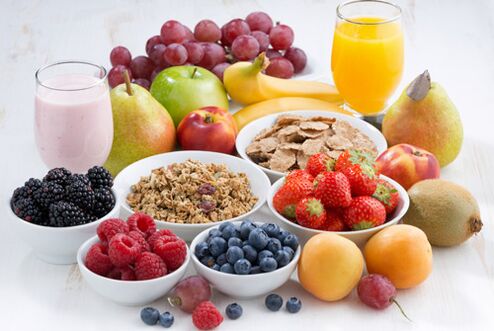
Proper nutrition for weight loss will bring more benefits and joy if you switch to it gradually, consistently and don't get lost. But first you need to understand why our bodies are so stubbornly resisting any change, especially a decrease in the amount of sugar.
Sugar is truly the scourge of our time. Some of the products offered to us in supermarkets don't even have a teaspoon of sugar in them. We're not even talking about candy now! Juices, yogurt, marinades, sauces, semi-finished meat products, sausages and sausages, fish preservatives, instant soups, instant noodles . . . The list is almost endless! The more terrible the impending transition to new nutritional principles - it turns out that we have almost nothing to eat!? Don't panic, there is a way out, and it's quite peaceful.
Proper nutrition for weight loss starts with three steps.
The first step:removes sugar in its pure form. Tea, coffee, compote without sugar. We refuse sweets, jams, sweets, chocolate, pastries and other pleasures from drinking tea with friends or on a work break. Ice cream, cakes and even low-calorie marshmallows are ostracized from our table! All carbonated drinks are prohibited. Try to go sugar-free for two weeks, just two weeks - you'll be surprised. Tea, it turns out, tastes different. Coffee too. Cocoa with milk, but without sugar, is better than any stimulant. And what to serve with tea? At this stage, nuts (not salted), dried fruits, energy mix with honey (a mixture of nuts and dried fruits, passed through a meat grinder, you can add lemon), sandwiches with butter (yes, yes! ), Normal cheese and sausage, and better with homemade braised pork, with caviar, lightly salted salmon, etc. At the same time, tea with all these items should be included in breakfast, lunch or dinner, and not become a regular snack. However, about snacks later.
Second step:When the body switches from fast to slow carbohydrates, it's time to eliminate foods that have a high glycemic index: premium wheat flour, white rice, and potatoes. This means that all the buns, breads, pies, porridge made from peeled rice, semolina porridge, and everyone's favorite manna and potato pies of all kinds automatically turn from everyday foods into delicacies. Yes, and the soup is now also without potatoes. At the same time, whole grain breads and bakery products made from wheat flour (without sugar, remember? ), buckwheat steamed or simply doused with clean water overnight, instant oatmeal, they are very well mixed with fermented dairy products, as well as all exotic or cerealsforgotten ones like spelled, quinoa. In addition, you need to eliminate frankly sweet fruits from the diet - bananas, grapes, pears. Berries are not included in this list because of their high acid content.
Third step:at this stage, you should abandon any carbohydrates, leaving only natural carbohydrates that are part of acidic vegetables and fruits. However, sometimes the first two steps are enough to reduce weight significantly. And if you meet several more conditions in parallel, then you will not have to look for a new diet for yourself - you will move to a whole new level, where proper nutrition comes first, and for life.
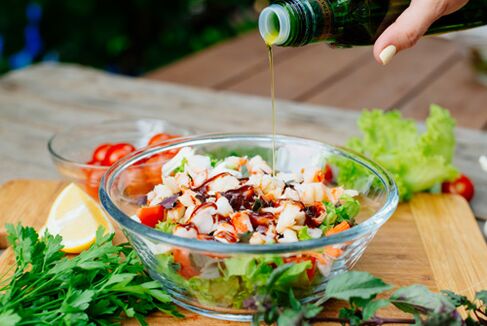
Proper nutrition for weight loss should vary.This means that the balance must include not only the notorious BJUs (protein, fat and carbohydrates), but also vitamins and microelements. And if carbohydrates provide us with energy in a pure and easily accessible form, then it is much more difficult for the body to get this energy from protein, and even more so from fat. But, as is often the case, the ones that are hard to come by are usually the most useful. Calories from carbohydrates are usually excessive, our bodies spend almost no time processing them, which is why "sugar calories" so quickly fit into the convenient roll of fat.
Protein is very important for our body.Protein is important throughout life: in childhood it is a building material, in adulthood it is an element that helps our body function and maintain itself at its best for as long as possible. Judge for yourself: proteins perform protective functions, help in the production of antibodies, transport, the most famous protein hemoglobin supplies oxygen to each cell, regulation - normal hormone production is impossible without proteins, motor - all kinds of movement are provided by the proteins myosin and actin, plastic - proteinsCollagen is responsible for connective tissue condition, skin appearance, etc. , energy - protein supplies the body with energy. But perhaps one of the most important tasks of proteins is the preservation and transmission of gene information. It is believed that the terrible disease that is becoming increasingly common "Alzheimer's disease" is directly related to insufficient protein intake (not only with it, but a slightly lower second most important component).
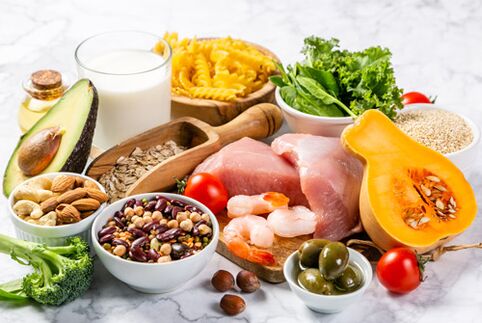
How much protein does the average adult need? Many nutritionists, doctors and advocates of proper nutrition adhere to the norm of protein intake, which was concluded more than a hundred years ago by the German scientist Max Rubner, and this norm is 0. 33 g of protein per 1 kg of human weight. A lot has changed since then, science has moved forward, and recent studies have concluded very average levels of 1. 2 - 2. 0 g per 1 kg of weight. Impressive difference. In addition, this 1. 2 - 2. 0 g is not the weight of the product, say, a piece of meat or a portion of beans, but the pure protein content in the product. A sample table of high protein foods is available on our website. Our site has written about the benefits of protein products more than once, but it never hurts to repeat this general truth.
Despite the huge popularity of vegan, raw food and vegetarian diets, we still need at least 50% animal protein to keep the body healthy and not in a state of survival. These are eggs, dairy products, fish and seafood, meat and offal. It is this protein that has a complete set of amino acids, unlike plant foods. Although a must-eat, if only because variety is the essence of proper nutrition!
It is clear that there are several products on our planet consisting of one substance. Almost all foods are a combination of protein, carbohydrates, and fat. And here with the final ingredient - fat - takes place, perhaps, the greatest crime story in the history of nutritional science. At one "perfect" moment, fat was declared the enemy of health. Everyone has heard horror stories about cholesterol, plaque in blood vessels and other horrors. And seeing how the store is refilling its assortment with low-fat or completely low-fat products at an enviable rate, you begin to doubt the sincere desire to provide us with "right", "healthy", "live" food, because there is nonothing true and useful in the absence of fat in the diet.
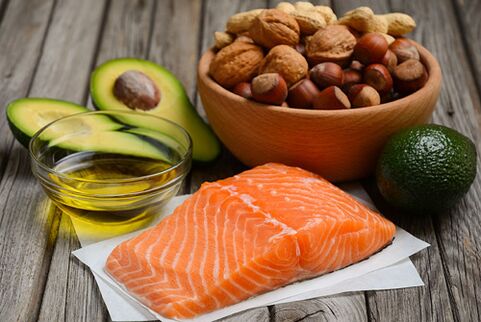
Then what is the function of fat in our body? You will say - helps in the assimilation of fat-soluble vitamins. Is that all? From biology lessons in school, one will remember the function of the fat heat exchanger. So, the most important function of fats in the body is the metabolism of surfactants, that is, in simple terms, ensuring the exchange of oxygen in the alveoli of the lungs. Fat covers the walls of the alveoli in the thinnest layer and allows us to breathe and breathe. . . life. My grandmother's methods of treating lung disease immediately came to mind: badger fat, dog fat, goose fat, hot milk and butter - there is fat everywhere, inside and out, and that helps! And, by the way, it still helps, only drugs for the treatment of hypoxia (oxygen starvation), which are now sold at a high price, are, in fact, fat emulsions. Another important function of fat is the synthesis of membranes. The cell membrane consists of 70-85% fat, and the function of the membrane is to ensure cell protection, thermal insulation and selective permeability (because not everything that tries to enter the cell is useful and necessary for it). The myelin layer, the insulating sheath of our nerves, is 70-80% saturated fat. Without myelin - get Alzheimer's disease, senile sclerosis (much younger) and dementia. Fat is one of the most important substances that are vital for the construction of membranes, myelin sheaths, ensuring their work, as well as the proper functioning of the central and peripheral nervous systems. Keep this in mind when choosing between 0. 5 and 3. 2% fat milk.
Another important function of fat is hormonal. It is fat that is the source for hormone synthesis, and there are a lot of them in our bodies. These are growth hormone, protein hormone, thyroid hormone, digestive system hormone, steroid hormone, adrenal hormone, sex hormone, etc. It is clear that the slightest bias, the lack of any hormone production threatens with major disturbances in the work of the whole organism. Sudden bouts of blackheads and pimples, any kind of skin rash are signs of low androgen levels. Headaches that are frequent "for no reason" can be a sign of low estrogen levels. Constant insomnia - not enough progesterone. Fatigue, fatigue and even fatigue even at rest can be a sign of a violation of thyroid hormone production. Hair loss is also a sign of this disorder. Weight gain can be caused by high levels of the hormones estrogen, cortisol, and insulin, coupled with low testosterone levels. Forgetfulness and distraction are indicators of low estrogen and cortisol levels. How everything is connected!
Fat is responsible for heat regulation. That's why men who are not on a diet are often sexier than women who are always losing weight. Frozen hands and feet are most likely a sign of a lack of fat, if it's not some kind of congenital anomaly. The most well-known function of fat is to dissolve and aid in the absorption of fat-soluble vitamins: A, E, D, K. Sitting on a low fat diet and taking vitamin complexes - not an option, vitamins will not be absorbed.
And finally, last but not least - vitamins, minerals, macro and micro elements. These substances are found in different amounts and combinations in all products, but special attention should be paid to fresh vegetables, roots, fruits and berries. One of the most valuable vitamins - vitamin C - is not synthesized in our bodies, and we can only get it from fresh plant products. Our site has filled a whole section on vitamins, read on, it's helpful! Plant foods contain enzymes and flavonoids, all kinds of minerals, without which we cannot function normally. For example, potassium - the work of the heart without it will be disturbed. Magnesium is responsible for the health of the brain, nervous and hormonal systems and is involved in metabolic processes. And also in vegetable products there is fiber - without it, digestion and peristalsis are almost impossible!
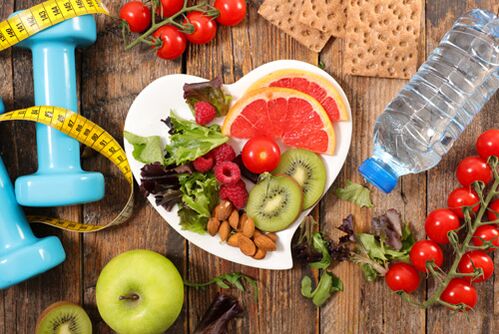
Proper nutrition for losing weight and improving the body includes the following principles:
Eat no more than three times a day. Unexpected, right? But what about 5-6 meals a day, which is advertised in many recommendations? Such fractional food is perfect for children, athletes and seriously ill citizens. If you don't fall into one of these categories, eat three or even two meals a day.
Eat only when you feel hungry, not at night. Breakfast is optional! If you don't feel like eating in the morning, reschedule breakfast a few hours later. Don't cram food in just because someone says breakfast is the most important thing.
Learn to listen to yourself and understand the difference between hunger and the habit of mixing things in between. The following recommendations will help in this regard.
Drink water. Not in liters, as is sometimes suggested. Not boiled. Ideally bottle or spring. The drinking regimen is simple to embarrassing: 2 glasses of warm water (not cold and not boiling) in the morning, 1-2 glasses during the day and 1 in the evening. Sometimes it's enough to drink water to understand that it's just thirst, not hunger.
Get in the habit of buying all kinds of nuts and seeds more often. In addition to fats, they contain a large number of macro and micro elements.
Eat whole foods. That is, not fat free! Cottage cheese - 9% fat, not less, but with sour cream, coffee with cream, butter sandwich, fatty cheese, fatty sea fish, exotic avocado, bacon! This is not the typical slope "from fire to fire. "Size is necessary in everything, of course.
Don't forget about protein! But what is no less important is what to combine it with. And this recommendation will be the last.
Eat vegetables. Lots of vegetables and spices. Fresh, pickled, pickled, steamed, boiled and even fried in oil! But fresh salad is of course preferred. It is not difficult to calculate the number of vegetables: mentally divide your plate into two parts - half will be occupied by vegetables, and the second will correspond to the minimum permissible protein, fat and carbohydrates.
Proper nutrition for weight loss is not a strict table and recipe. This is a deliberate approach. All of these tips will only work if you are almost completely carb-free. If you combine protein with carbs (mashed potatoes with cutlets) or fat with carbs (pork on bread) in one plate, you're done. More precisely, no, of course, you won't die right away. You'll just go on living, complaining about every new kilogram and complaining about injustice ("I'm literally sitting on the same water, where does the fat come from??? "). No need to sit on the water, no need to torture yourself with hunger, food products. Start with three steps and walk, without turning anywhere, to health and beauty.














































































